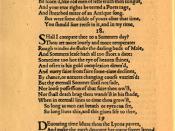Shakespeare's eighteenth sonnet is, perhaps, one of the best-known sonnets contained in the English literary canon. It is a conventional Shakespearean sonnet that explores conventional themes in an original way. With characteristic skill Shakespeare uses the sonnet to exalt poetry and his beloved.
The first quatrain introduces the primary conceit of the sonnet, the comparison of the speaker's beloved to a summer's day. In the first line the speaker introduces the comparison of his beloved to a summer's day. The speaker then builds on this comparison when he writes, "Thou art more lovely and more temperate" (2) because he is describing his beloved in a way that could also describe summer. When he describes "rough winds [that] do shake the darling buds of May," (3) he is using rough winds as a metaphor for capricious chance and change, and he implies that his beloved does not suffer from these winds as summer does.
The first quatrain, therefore, introduces a comparison that is expanded upon by the remaining two quatrains.
The second quatrain strengthens the comparison of the beloved to a summer's day. The speaker anthropomorphizes the sky, or "heaven," (5) by using the metaphor of an "eye" (5) for the sun so that the comparison between a person and a season becomes vivid. By assigning heaven an "eye," the speaker invokes the image of his beloved's eyes. Similarly, in the next line when the speaker mentions that summer's "gold complexion" is often "dimmed," (6) he is attempting to compare another human attribute of his beloved with some trait of summer. The second quatrain presents summer as possessing only mutable beauty.
The third quatrain no longer focuses on the mutability of summer, but it speaks of the nearly eternal nature of the memory of the beloved. When the speaker...


